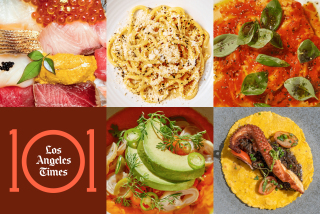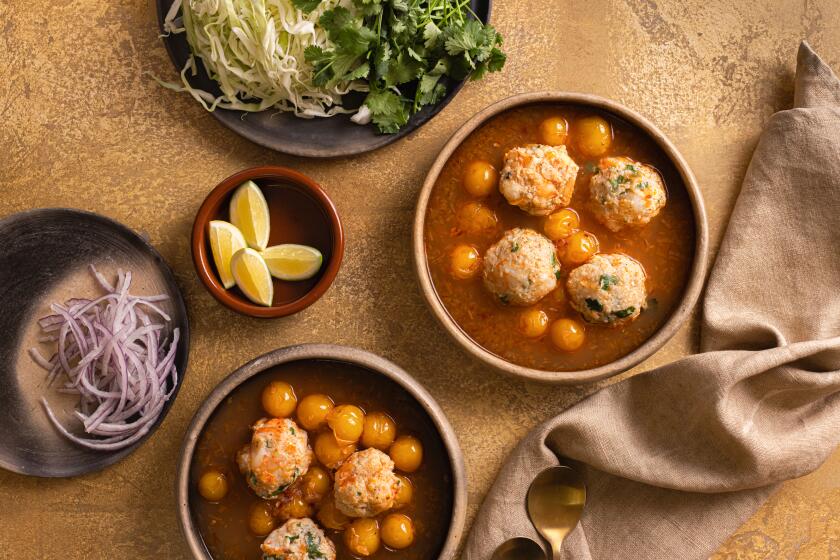Maywood bakery’s <i>roscas</i> help make the end of Christmas season sweet
The baker’s luck ran out just after sunrise -- the worst possible time.
Customers poured in asking for roscas, the sweet, crown-shaped holiday pastries that transform Mexican bakeries each Jan. 6 into frenzied scenes reminiscent of flower shops on Valentine’s Day.
Three Kings Day marks the end of the Christmas season for many Latino families, and the pastries are the centerpiece of the annual celebration.
At America’s Cafe & Bakery in Maywood, manager Manuel Cordova had to bake more than 3,000 roscas this year, so he began to prepare four months ago. He ordered nearly 6,000 pounds of dough, about 3,000 blue-and-gold boxes, 70 pounds of figs and 200 pounds of a secret ingredient from Mexico.
His crew of eight worked 17-hour days in the last week to bake about 500 roscas a day. More than 1,500 were shipped to five nearby grocery stores. Dozens more went flying off the shelf Wednesday.
Then came the bad news.
The morning’s batch of 200 roscas were left in the cooler too long, making it impossible for the cold yeast to rise in the oven. Cordova turned customers away, telling them to come back in two hours when, hopefully, more of the pastries would be ready.
“Everybody kept asking ‘Give me two roscas, give me three!’ But we had nothing to give them,” Cordova said. “It was the most frustrating thing.”
By nearly 10 a.m., the sugary orange aroma of the roscas began to waft through the bakery once more.
Ranchera music boomed in the back of the shop as bakers in white aprons hauled the warm concoctions from rusty ovens and then pounded fresh dough to start an afternoon batch.
Up front, cashier Sujey Villanueva began to smile once more. “We got through it,” she said.
Many Latinos in Southeast Los Angeles have come to rely on the 30-year-old bakery for their holiday celebration.
One woman ran in from down the street in pajamas to pick up a laptop-sized rosca for her children.
A man grabbed the biggest size, comparable to a suitcase, for his co-workers at a nearby office.
Hugo Equizabal, 51, dropped in at the behest of his wife to reserve two pastries for his family. The Salvadoran knew little about the annual custom until he married a Mexican.
“I still don’t know much,” he said laughing. “But I know it tastes good.”
The centuries-old tradition is celebrated by Spanish-speaking Catholics to honor El Dia de Los Reyes, or Three Kings Day. It symbolizes the adoration of the Christ child by the Magi. Familiar in some parts of Europe, including France and Spain, the rosca represents the crown of the kings. Three tiny plastic baby Jesus figures are concealed in the dough, symbolizing the hiding of the infant Jesus from King Herod’s troops.
Those who find one of the baby Jesuses on their plate are blessed, or, some might argue, cursed: They must cook a feast, often of tamales and hot drinks, for the entire family. The meal takes place the next year or, for some, on Feb. 2, the Day of the Candelaria, when Mary presented the infant Jesus to the temple.
As the economy soured in recent years, Cordova said some families have asked him to bake not three, but rather eight or nine, baby Jesuses inside a cake. That way, relatives can more evenly distribute the expense of planning the feast that follows.
Just before lunch Wednesday, Maria Garcia, 64, showed up at America’s with her 9-year-old nephew, Angel Lopez, at her side.
“He wants to feed our entire apartment building, so we need a really big rosca this year,” she told Cordova.
He pointed to biggest box, at $19.99, then gave her a taste.
“Rico,” she said. “Delicious.”
Using a $20 bill that Angel had found on the ground at their local laundromat, the two planned to serve rosca to eight families, then wash it down with hot chocolate.
Garcia hopes her slice of rosca this year lands on her plate minus a Jesus. Last February, the baby cost her several days of work because she had to prepare a tamale feast for 50 people in her neighborhood.
“You have to do it,” she said. “You don’t want bad luck chasing you around.”
esmeralda.bermudez@latimes.com
More to Read
Eat your way across L.A.
Get our weekly Tasting Notes newsletter for reviews, news and more.
You may occasionally receive promotional content from the Los Angeles Times.







